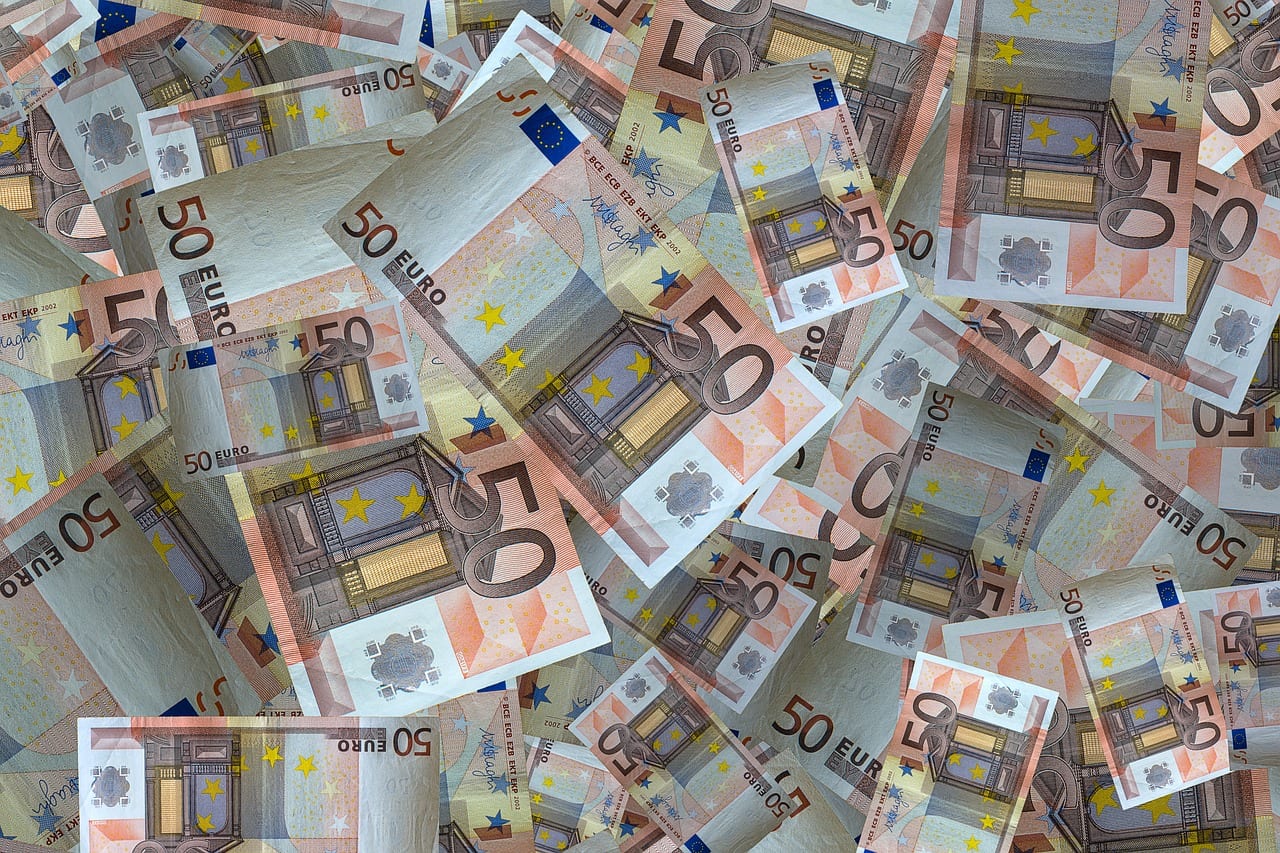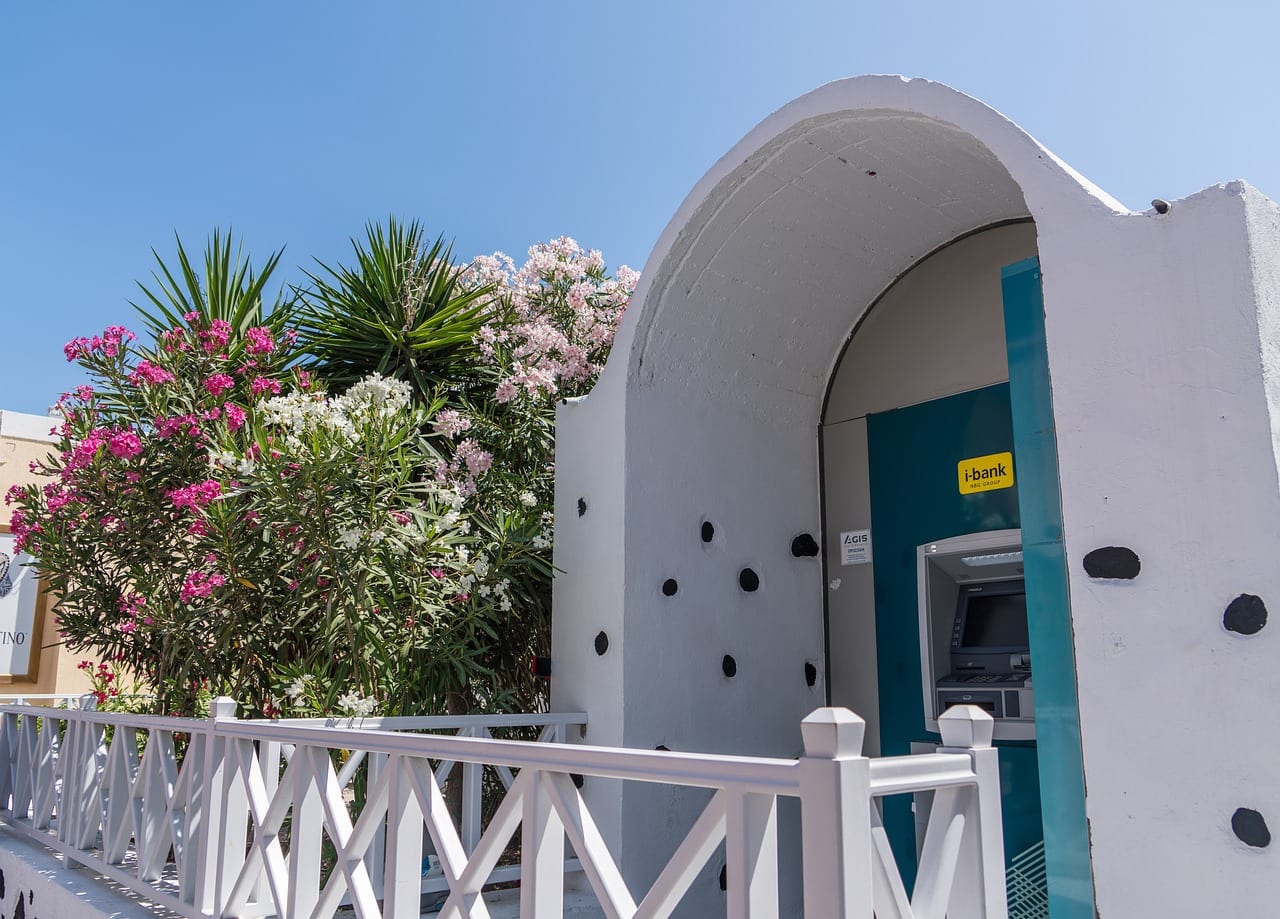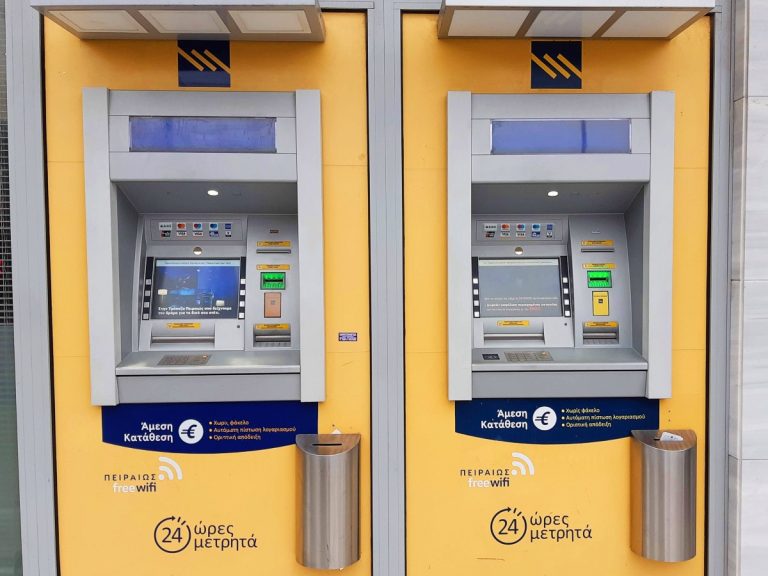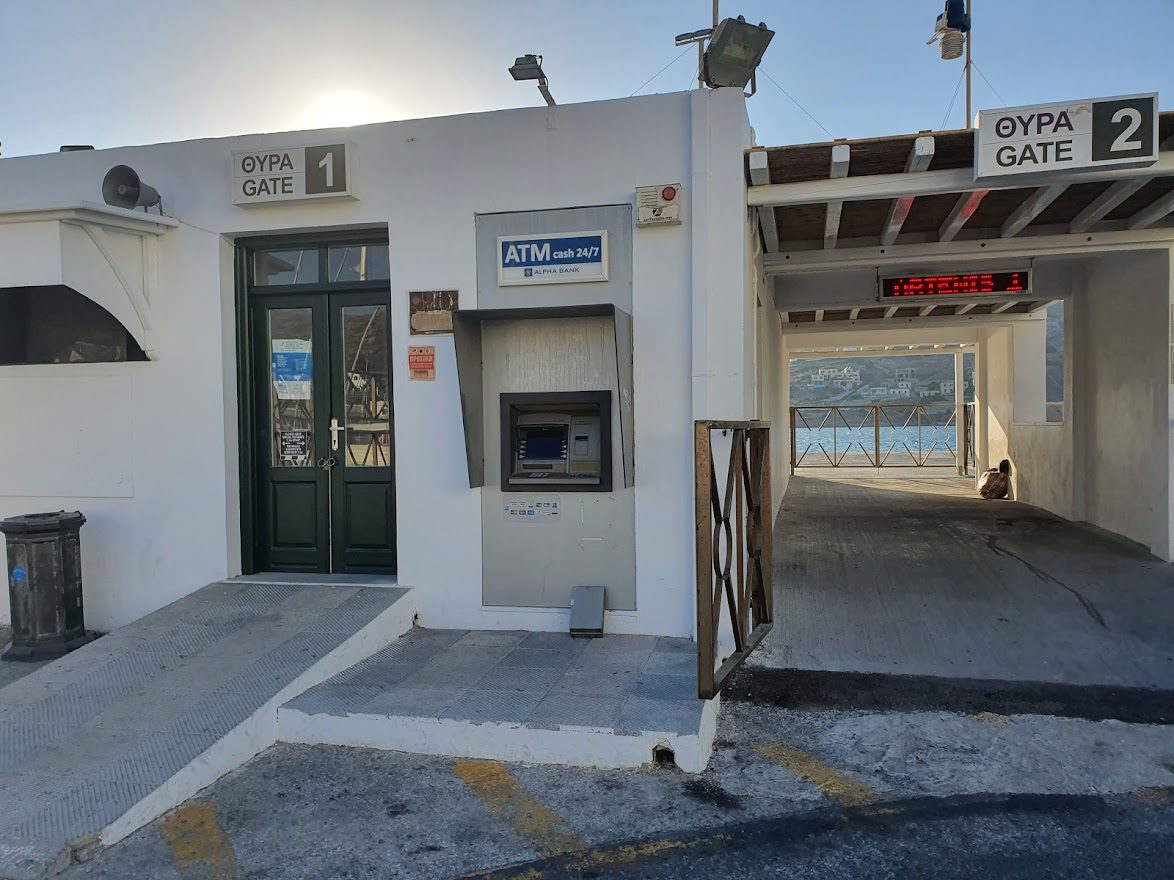Here's everything you need to know about money in Greece. Currency, ATMs, banks, credit cards and more, this guide will show you how to get hold of and spend your Greek money.

Greece Money Travel Tips
There are a few things it's handy to know about getting hold of and spending Euros in Greece, which is why I created this short guide.
If you're planning to visit Greece on vacation, you'll find everything you need to know about money in Greece here!
You'll also find the reader comments section about exchange rates and ATM's in Greece at the bottom of the post useful. These describe real life experiences, and might be quite eye-opening when it comes to taking money out of cash machines in Greece.
If you take anything away from this blog post, make it this: Avoid Euronet ATM machines! (They have a terrible exchange rate and withdrawal fees).
What currency does Greece use?
Official Currency: Greece uses the Euro, which is also the official currency of 19 of the 27 member states of the European Union. The euro system consists of eight coin denominations: 1 and 2 euros, as well as 1, 2, 5, 10, 20, and 50 euro cents. There are also six different notes: €5, €10 , €20, €50, €100, and €200.
The Euro was adopted as physical legal tender in Greece on 1st January, 2002. It is available in both coin and note denominations.
What ATM to use in Greece for UK cards?
Your UK bank cards will work on any ATM in Greece. I tend to avoid the Eurobank ATMs when possible as they do not give very good exchange rates, and extra fees are often more than other banks.
Can you use dollars in Greece?
No you can't spend dollars in Greece. You will need to either exchange your US Dollars for Euros, use your cards, or withdraw Euros from an ATM when on vacation in Greece.
Can I withdraw money from ATM in Greece?
Withdrawing money from the ATMs in Greece is your best choice if you have a bank card you can use internationally. There are ATMs in all the main tourist areas, towns and cities in Greece.
Can you use cash in Greece?
You might have heard that cash is King in Greece. This is rapidly becoming dated advice though.
For the last few years, businesses have become obliged to use Point of Sale (POS) machines for cards. Since the pandemic in particular, chip and pin payments have now become the norm.
This means it's easy to use your bank cards everywhere – even in the local kiosks on street corners.
As a result, the days of needing to carry around hundreds of Euros to pay for hotels and restaurant bills are over. You'll still want to carry some Euros with you of course, but there's no need for a bulging wallet!
Just remember that shops and restaurants do not accept foreign currency.

Best way to exchange money in Greece
If you are looking to exchange your own currency to Euros when in Greece, you'll want to use a foreign exchange. You can find these in most tourist areas, but don't expect any on the small Greek islands.
Many banks also change money, but you should expect the process to take a long time. People think I'm joking when I say it can take over an hour to change money at a local bank in Greece, but try it for yourself and see!
When changing money in Greece, make sure that you don't receive a note larger than a 50 Euro, as it will be difficult to use anywhere.
In my opinion, it's best not to exchange physical currency at all unless you really have to. Either bring some Euros with you from your own country, or withdraw Euros from an ATM.
Getting hold of your money in Greece
You've got plenty of options to get hold of your money in Greece. These include changing money at your domestic airport (terrible choice), changing money on arrival at the Greek airport (bad choice), using a money changer (bad choice) or using ATMs in Greece (probably the best option).
I'd suggest whatever option you choose as your primary means of getting hold of money in Greece, you bring a few Euros over with you anyway.
There's nothing worse than arriving at an airport in a foreign country to find out you can get hold of the local currency because ATM machines are closed, and all the exchange kiosks are shut for the night!
Using ATMs to withdrawn money in Greece
This is probably the best method of getting hold of cash in Greece. You can find ATMs in every major town and city, and practically every inhabited Greek island has at least one machine.
You will find ATMs in supermarkets, airports, ferry ports, metro stations and other public places.

There are a couple of things to keep in mind when using ATM machines to access your money in Greece.
The first is that there may be a daily withdrawal limit from the machine as well as your card itself. You may even need to tell your bank that you are travelling to another country so that they will authorize its use overseas.
Another thing to keep in mind, is that some machines will offer two exchange rates. One is normally a lot more than the other! You should do your due diligence and work out what your own bank will charge you for withdrawing cash abroad.
Finally, if travelling to a smaller island, you may find that machines run out of cash from time to time. Don't leave it until the last minute to withdraw!
Check out my Revolut Card Review if you're from the UK or non-Eurozone country looking for a travel cash card for your vacation.
If you are from the United States, you might find Wise a better option for travel money.
Are there ATM's in Santorini?
There are plenty of ATMs in Santorini outside banks in Fira (where most cruise ship passengers arrive), and also along popular streets where there are ‘hole in the wall' ATM's. Most ATM's charge to withdraw money, and offer options to choose the ATM's conversion rate or your own bank's conversion rate.
Which ATM should I use?
Personally, I avoid the EuroBank ATMs whenever possible. They are notorious for hidden fees and poor exchange rates.
My preference whenever possible is to use a Piraeus Bank ATM when withdrawing money, as I find them simpler to use. Alpha Bank machines run a close second in my opinion.
You should note that when making cash withdrawals from an ATM in Greece, you may be charged a fee when using a foreign bank card. These may range from 2 to 3.75 euro.

Using Debit and Credit Cards in Greece
Credit and debit card usage in Greece is becoming more widespread like other parts of Europe. In fact, the government is actively encouraging and enforcing card use for some businesses, particularly in the hotel industry.
So, you will be able to use your credit and debit cards in shops and hotels, fuel stations and shops up and down the country. This includes the Greek islands.
When it comes to bars and tavernas though, you may need to check their machine is working. You would be surprised at how many card machines are ‘faulty' in these places when they work perfectly everywhere else. Very strange!!
Greece Currency Exchange Rates
The dollar to USD rate is always changing. You will also find that currency exchanges in for example the Athens airport give much poorer rates than if you were to withdraw money from an ATM machine.
Even little commission rates can add up during your vacation in Greece. Keep your eye on the exchange rates by using Google. I've included some below for historical information – you might be interested to see how these US dollar euro exchange rates change over time!
In May 2020, the exchange rates were:
Greece currency to USD: 1 Euro buys 1.09 USD.
Dollars to Greek currency: 1 USD buys 0.92 Euros.
Greece national currency to Indian Rupee: 1 Euro buys 82.77 Indian Rupees.
100 Indian Rupee buys 1.21 Euros
In November 2021, the rates to exchange currency were:
Greece currency to USD: 1 Euro buys 1.12 USD.
Dollars to Greek currency: 1 USD buys 0.89 Euros.
Greece currency to Indian Rupee: 1 Euro buys 83.69 Indian Rupees.
100 Indian Rupee buys 1.19Euros
In July 2022, the exchange rate in Greece today was:
Greek money vs US Dollar: 1 USD buys 0.99 Euros
Euro to Indian Rupee: 1 Euro buys 80.31 Indian Rupees
100 Indian Rupees buys 1.25 Euros
September 26, 2024, the exchange rates for the relevant currencies were as follows:
1 USD buys approximately 0.90 Euros
1 Euro buys 83.7 Indian Rupees
100 Indian Rupees buys about 1.07 Euros

Related: Best time to go to Greece
Can I open a bank account in Greece?
If you're only traveling to Greece on vacation, opening a bank account is not really an option. If you plan to spend longer in Greece either as a digital nomad, or you want to move to the country, then it certainly can be.
There's a great guide here on how to open a bank account in Greece.
Money in Greece Checklist
Here's a few things to do with money I suggest you add to your to do list before traveling to Greece:
- Get hold of a couple of hundred Euros in your own country at the best rate possible
- Have two or three different cards to take with you
- Find out if there are any additional fees for foreign purchases or overseas transactions
- Inform your card issuer you are traveling out of the country
- Make sure any hotels in Greece you book take a credit or debit card as payment
- Read this guide on how to hide money when traveling
You might also want to take a look at this International Travel Packing Checklist to save you time in other areas of planning!
More facts about Greece currency
Here's a few more facts and insights into the money of Greece:
Does Greece still use euros?
The euro is the official currency in Greece, and has been in use since January 2002 when it replaced the drachma as legal tender.
What was the old currency in Greece?
Before being replaced by the Euro, the Greek Drachma was the old currency of Greece. It is no longer legal tender, so if you have any old drachmas (the Greece currency before Euro), they won't be of much use to you!
What is the best currency to use in Greece?
You can only use the local currency in Greece, which is the Euro. When spending money for goods and services, you can either use cash or bank cards. Businesses are now legally obliged to accept credit cards or debit cards as payment.
What are the Euro coins denominations in Greece?
Greece is one of many European countries which uses the Euro as its form of currency. The coin denominations are: 1, 2, 5, 10, 20 and 50 cent, €1 and €2.
What are the Euro note denominations in Greece?
There are seven denominations of euro banknotes that are legal tender: €5, €10, €20, €50, €100, €200 and €500. You are unlikely to see €100, €200 and €500 notes in regular circulation as stores are reluctant to accept them.
What was the drachma to Euro exchange rate?
At the time that Greece adopted the Euro as its monetary unit, the exchange rate was set at 340.75 drachmae to the euro)
What currency is used in Athens Greece?
The currency used in Athens, Greece is the Euro.
What is the Eurozone?
The Euro is the single currency for 19 of the 27 member states of the European Union. These 19 countries are often referred to as the Eurozone, and Greece is a member.
So, if you are continuing your vacation to another European country after Greece such as Italy, you will also be able to use Euros there as well.
Did Greece almost leave the Euro?
In 2015, the repercussions of the global bank crisis somehow left Greece holding the bill. Among the drama, the specter was raised of a ‘Grexit', where Greece might either have to leave the EU and abandon the euro.
Whether they would have gone back to the former drachma Greek currency or created a new one was never fully discussed in public. As events came to pass, Greece remains in both the European Union and Greece's currency is still the euro.
What was the money in Ancient Greece?
The Drachma was the form of Greek cash used in ancient times. The were used by several Greek city states, and were originally minted from silver.
How much cash should I bring to Greece?
While you can now use cards everywhere in Greece, it's always nice to carry some Euros with you just in case. Consider bringing 200 or 300 Euros in cash with you, or withdraw more or less that amount when you first arrive.

What is the currency in Greece?
The currency in Greece is the Euro, which replaced the drachma as legal tender in January 2002. There are seven denominations of Euro banknotes and eight coin denominations in use in Greece. Business are legally obliged to accept credit or debit cards, but it is still recommended to carry some Euros in cash when traveling in Greece.
More Information
Looking for more information on planning a trip to Greece? My travel tips for Greece are a good starting point before moving on to these blog posts:
- Greek Islands Guides
- Things to do in Athens in 2 days
- Numismatic (Money) museum in Athens
- Day trips from Santorini
- Sunset Hotels in Santorini
- Where to go on a Greek road trip
- Reasons to visit Mykonos
- Cheapest Greek islands
If you still have questions about anything regarding money for your Greek vacation, leave a comment at the end of the blog post!
 – Dave Briggs
– Dave BriggsDave is a travel writer based in Greece. As well as creating this guide to the currency used in Greece, he's also written hundreds more travel guides to Greek destinations. Follow Dave on social media for travel inspiration from Greece and beyond:
Is there any change in banks you would recommend or not recommend for ATM exchanges/withdrawals?
Two major changes –
1. Tap and Pay is almost everywhere now, so you will need less cash than you think
2. Would still avoid Eurobank ATMs. Try to withdraw from ATM machines outside a bank branch if possible.
We have just returned to Australia after an extended holiday in Greece. We used Alpha Bank for withdrawals with a Macquarie debit card which is fee free. A withdrawal of E500 in early May cost A$815 with a local fee of $4.08.
My daughter joined us after a couple of weeks and withdrew E500 from what was presumably a tourist exchange ATM in Athens which, after checking her a/c in Australia, cost $946.30 with a $5 fee. This is a shocking difference in exchange rates. Is this normal for this type of ATM. If so, visitors should be very wary when exchanging money.
Many thanks for all the useful advice we found on your website throughout the trip!
Hi Julie,
Sorry to hear about your daughter’s exchange rate – quite a difference!
A few factors contribute to this:
– The May exchange rate fluctuated, if you got it at the very best time, and she got it at the very worst time, it may explain some of the difference
– If she took out the money at the weekend, she would have had a much worse exchange rate
– If she accepted the Euro exchange rate from the ATM, she definitely would have come off badly
– If she had a different bank, her fees might have been different
– Lollapalooza effect – Some or all of these combined would account for the difference!
It can be a bit of a minefield trying to get the best exchange rates. I use a multi-currency account like Wise or Revolut (with a balance in all major currencies) so I don’t get caught out.
Hi Dave. In 2 weeks I’ll be leaving for a 3-week vacation in Greece. I ordered euros in advance and ask for mixed bills but when I pick them up from the bank predominantly they are in $200 euros. No one here is able to or willing to exchange for smaller denominations. Any suggestions of what I can do? Thanks so much!
Hi Kim,
I have to say I’ve never seen a 200 Euro note in regular life here in Greece. Even the 100 Euro are rare!
If the idea of having them is to pay for hotels, there should (?) be no problem.
If you wanted to pay things like taxi drivers and tavernas there might be issues.
Best I can advise is to just see what happens trying to use them, but at least try to get a couple of 50 Euros.
You might want to put aside an hour or two on one of your first days in Greece and visit a bank to see if they can break them down for you.
Do U.S. banks typically give a better exchange deal versus the Greek ATM? We’re trying to decide if we should get cash in the U.S. before we leave, or wait and use an ATM when we arrive in Greece. We did get 295 euros for now so that we’d have some at the airport when we arrive. Huntington Bank charged only a flat $8 fee, which wasn’t bad, but 295 euros cost me $340 dollars today (3/28/2023). Did we get ripped off on that? Could we have done better at an ATM?
Hi Laura,
A bank rate will 99 times out of a hundred be better than the ATM exchange rate.
The rate you got wasn’t great though it must be said!!
However, you might have got worse at the ATM (and also there would be an atm withdrawal fee of a minimum of 2,60 – even I pay that over here!).
Now that said, I suspect many of your transactions in Greece will be paid by card. (There’s no need to pay in most places with cash now).
So, it’s worth looking how your bank(s) deal with foreign purchases in regards to exchange rates etc.
In the past, credit cards used to give better rates than banks.
The reason nowadays that I recommend people look into Wise accounts, is because the exchange fees are a lot more transparent. You can even hold a balance in Euros, which means that any transactions you make will come off the Euro balance so you don’t have any further exchange fees. The app on the phone also means you can keep an eye on what you are spending in Greece in real time!
Good afternoon from Naxos Dave,,
Great information . Is it better to exchange us currency at local bank rather than using ATM or Credit Card( Visa/Mastercard)?
It will definitely be quicker to use the ATM – Greek banks are not the quickest places to visit, and best avoided in my experience!
You’d also probably only find out right at the end of the experience about any fees as well.
My preference would be to use the ATM, however this does depend a lot on your own bank and what exchange rates they provide.
Assuming your bank or card provider offers a good service, if using the ATM, you almost always want to refuse the ATM’s own exchange rate – this is typically a horrific rip off!
Bottom line – get the calculator out, figure more or less what the exchange rate is and that your X dollars should equal Y Euros. Assume you’ll lose about the equivalent of 10 dollars in fees somewhere along the line, and go with which ever option gets you closest to your number Y.
One last note: Avoid EuroBank ATMs at all costs!
What is the best credit cards to use??
Hi Bob,
Visa and Mastercard are the two best credit card types to use in Greece. American Express typically has higher fees for the retailer, so not as many accept it.